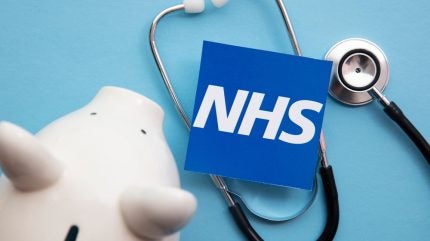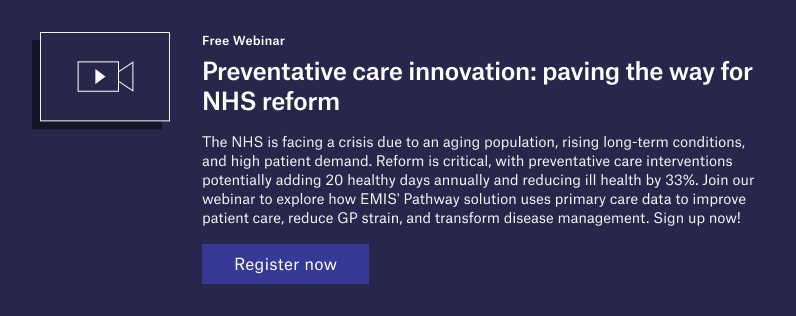
“The National Health Service in England is in serious trouble” according to a landmark investigation by the Rt Hon Professor the Lord Darzi of Denham.[i] Patients in deprived communities are struggling to get a GP appointment, waiting times for hospital procedures are at a high, staff are disengaged, and A&E departments are overwhelmed by demand, with long wait times causing an estimated 14,000 avoidable deaths a year. All in all, the findings paint an ominous picture of a health service in crisis.
Speaking about Lord Darzi’s report, the Prime Minister Sir Keir Starmer has warned that the NHS must “reform or die” – but what will reform look like?[ii] As we await a new ten-year plan to be released in the next few months, the PM has proposed three focus areas. First – the move to a “digital NHS”. Second – transitioning a greater proportion of care from hospitals to community settings. And third – greater focus on preventative care efforts.

Community care and preventative care could go hand in hand, with Lord Darzi’s review emphasising the importance of delivering integrated, preventative care closer to home. The report states that interventions that prevent illness are typically far less expensive than those that deal with its consequences. It offers the example of the NHS Diabetes Prevention Program, which has successfully reduced the risk of Type II diabetes by almost 40%.[iii]
Professor Deanfield’s taskforce
Preventative care was also in focus earlier this summer when it was announced that Prof John Deanfield, the first government champion for personalised prevention, has stated that a “parallel health service” focused on upstream, preventative health is necessary to save the NHS.[iv] Deanfield has been asked by the Secretary of State to set up a taskforce to explore radical improvements to national health. One of his priorities is to move preventative health services such as weight, cholesterol and blood pressure checks into the places people live, work, and play, thereby making them quick and easy to access day to day.
He said: “Our current approach to health is unsustainable, both for the health of the population and for the economy. A reorientation towards prevention is the only way to avert the growing health and wealth crisis.”
Former chair of the NHS David Prior said such changes could help to mend a “broken system”, with the potential to become as important to the country as the NHS itself. Indeed, a report by the Tony Blair Institute was published this summer laying out the macroeconomic case for disease prevention. The report estimates that a 20% reduction in the incidence of cancer, cardiovascular disease, chronic respiratory disease, diabetes, mental health, and musculoskeletal disorders could increase the UK’s GDP by 0.98% within ten years – an amount equivalent to £26.bn per year.[v]
Finding the right patients
Unfortunately, the path to preventative care is not easy. For many diseases, upstream prevention requires identification and communication with at-risk patients from within primary care and occasionally referral to specialist healthcare services or teams. But with the number of fully qualified GPs relative to the population falling, this workforce has increasingly less time to dedicate to proactive health consultations, something which forms the bedrock of NHS primary care.
“There are countless scenarios where general practice have patients who unknowingly or perhaps knowingly have risk factors and symptoms which could be better addressed elsewhere in the care system, but GPs haven’t had time to go out proactively looking for that work,” says Dr Ian Wood, NHS GP and clinical director at EMIS, the leading provider of clinical software in the UK.
To help preventative care teams harness the primary care data within its platforms, EMIS has developed a case finding solution called Pathway. The premise is to use powerful analytics to search the health data for cohorts of patients who could benefit from a particular healthcare intervention, whether that’s a new diagnostic test for liver disease, a vaccine for cancer prevention, or a medication to reduce the risk of thromboembolic disease. Integrated into the EMIS Web platform, the software enables GPs to seamlessly share the relevant patient information with the organisation who is best placed to provide that care, supported by secure, ethical and governed data access controls. This enables the patient to proactively access the necessary disease prevention pathway, supporting timely and efficient care.
“Pathway is any incredibly exciting tool,” says Dr Wood. “It empowers teams who have the agency and expertise to manage specific areas of care with the breadth and quality of primary care data. It can relieve some of the pressure on stretched primary care teams at the same time as allowing patients the opportunity to access care in a much more streamlined and efficient way. Furthermore, it is flexible by design and so meets head-on the realistic challenge that local and regional health systems all deliver their version of that care in their own way.”
The potential grows when you consider the use of Pathway alongside other analytics platforms that EMIS offers, digesting data from granular primary care level through to ICB population health. The integration of these systems surfaces major opportunities to drive proactive care, supporting better outcomes for patients and significant savings for the NHS.
On 29th October, EMIS is hosting a webinar on Preventative care innovation: Paving the way for NHS reform. The panel will explore cutting-edge examples of preventative care in action and discuss how the Pathway solution is already helping to eliminate Hepatitis C, manage chronic kidney disease, and improve Atrial Fibrillation care. To register, please click here.
To learn more about how life sciences companies and the primary and secondary care system can collaborate on preventative care, download the whitepaper below.
© EMIS Group Limited. All Rights Reserved
- [i] Department of Health and Social Care. Independent Investigation of the NHS in England. https://www.gov.uk/government/publications/independent-investigation-of-the-nhs-in-england. Accessed September 2024.
- [ii] Sky News. NHS must ‘reform or die’, warns PM – as new report says service in ‘critical condition’. https://news.sky.com/story/nhs-must-reform-or-die-warns-pm-as-new-report-says-service-in-critical-condition-13213017. Accessed September 2024.
- [iii] Independent Investigation of the NHS in England.
- [iv] The Guardian. UK must move towards disease prevention to save economy and NHS, says expert. https://www.theguardian.com/society/article/2024/jul/23/pre-nhs-disease-prevention-health-checks. Accessed September 2024.
- [v] Tony Blair Institute for Global Change. Prosperity Through Health: The Macroeconomic Case for Investing in Preventative Health Care in the UK. https://institute.global/insights/economic-prosperity/the-macroeconomic-case-for-investing-in-preventative-health-care-UK. Accessed September 2024.


